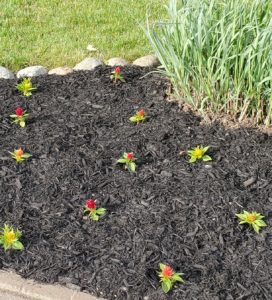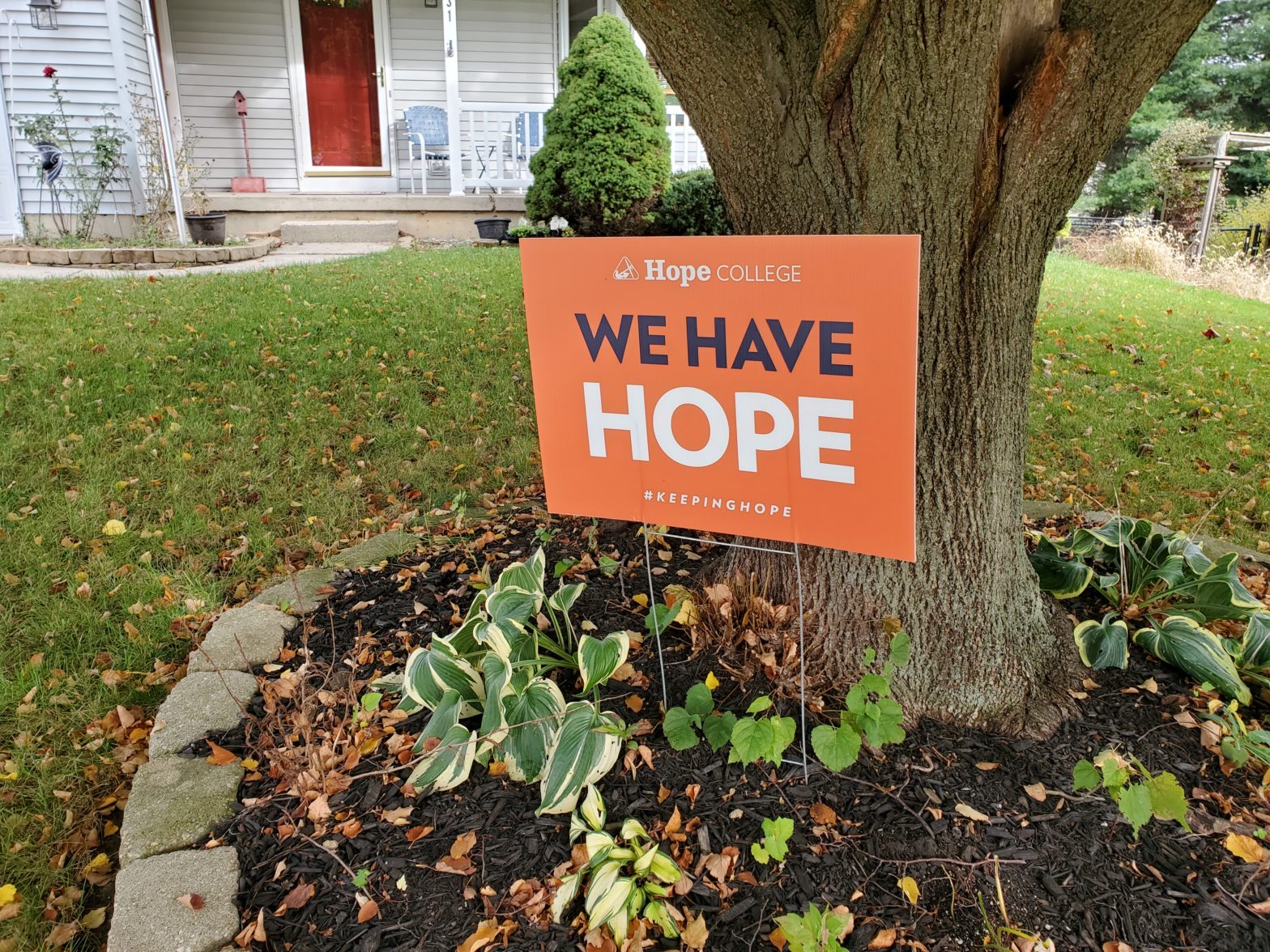by Bonnie Vander Wal, Ph.D., CAPS Staff Counselor
This post is the third in a series of three posts leading up to Election Day, 2020. CAPS staff counselor Dr. Bonnie Vander Wal writes to help the Hope Community navigate the turbulent election season with an eye on maintaining mental health.
Well, here we are. Election “day.” Or, the day we start counting election ballots. In a simpler time, election “day” was a thing. Typically, even though all of the votes were not counted yet, there were enough recorded that a winner could be projected, often to the point where one candidate concedes to the other, and the victory speeches begin.
As you are well aware, it is not that simpler time. Finding out who will serve as our next President may take weeks or even months. Of course, this is primarily due to living in the midst of a pandemic where absentee voting became a viable, if not recommended, method of casting one’s vote. Thus, in different times we should expect a different process, i.e. not knowing conclusively in one day who will lead the country in the next 4 years.
If this hasn’t been an unprecedented enough year already…
But please, don’t stop reading yet. This is a CAPS blog so you can be sure we will be offering HOPE and helpful strategies shortly.
First, let me be clear about something. The global pandemic, racial injustice, economic instability, and natural disasters have placed enormous stressors on our way of life. Then we have to put up with a volatile political climate and gear up for finals week. This is our reality right now. Please know that it is quite unrealistic to expect yourself to perform normally in the ways you usually do, given this extraordinary drain on your energy.
Please know that it is quite unrealistic to expect yourself to perform normally in the ways you usually do, given this extraordinary drain on your energy.
Typically we are able to use and replenish energy interchangeably while also keeping some on reserve in our “resilience banks.” When times get tough, we draw it out, we manage, we get by, and we pull through, and then put back in. Currently, the increase in demand and extra pressure quickly depletes our energy supply, often before we can stock up on more. If this rings true for you, you are likely feeling at a loss, drained, and/or defeated. Please recognize that experiencing fatigue, lack of motivation, less interest in things, and disrupted patterns of eating, sleeping, and socialization are natural responses to carrying heavy burdens. I encourage you to give yourself grace and compassion.
Planning for self-care

As we embark on the next few weeks, I want you to think about attending to your needs as a first priority. You’ve likely heard the message that says to plan your vote. Well what about planning for self-care? Given the challenges that exist right now, especially as a college student on the verge of final exams, shouldn’t we plan for how we will take care of ourselves? If it sounds like just one more thing to do, I advise you to reconsider how making some decisions now will pay off later.
Look, in times of high stress, it is more difficult to make decisions. It may be harder to process what you need, when, and how. The more you can determine in advance, the less energy you will have to put into deciding in the moment, which helps you reserve it for other things. If you can come up with some general guidelines in advance that plan for your self-care, you are likely to stay more focused, less distracted, and on task with what you want and need to accomplish.
In Part 1 of this blog series, we looked at how participation in the political process can empower us, connect us to our communities, and further our sense of purpose. In Part 2 we examined how to effectively talk to others whose views differ from us and why this is important. Going outside your bubble helps improve communication skills which builds confidence and comfort around others. These are all important factors in reducing psychological distress and improving mental health.
Part 3 focuses on planning your self-care. Truthfully, we just don’t know what to expect over the next few weeks and that uncertainty wears on us. Let’s shift our focus to what we know and what we can make more certain moving forward.
The 5 “C’s”
Think about this. When we want to boost our immunity, we take Vitamin C. What do we do when we want to boost our self-care? Why not try some more C? That is, these 5 “Cs” in particular: Cultivate, Connect, Contain, Commune, and Comfort.
Cultivate

Attend to your basic needs. You know you are supposed to nourish, move, and rest your body. This is not news to anyone and it is probably the easiest to plan ahead. Sometimes we spend more energy negotiating these factors than just putting them in motion. Decide ahead of time when you are generally going to get meals, get moving, and get to bed. You don’t have to define the exact time in your planner; rather, note a space where you will attend to each one. Eat something for breakfast between 9 and 10 am, or go for a walk prior to dinner. Get to bed between 10 and 11 pm. Figure out what times work best for you and do it.
This also means planning for breaks and things you enjoy. Don’t wait and determine IF you need a break, just schedule WHEN you will take that break. Do you have a favorite show to watch? Listen to music? Do you like to color or spend time reading? Don’t forget about planning social time. Build some “check in” times in your schedule where you assess how you are doing and reach out to your support system. Whatever it is you like to do, make sure to do it.
Connect
Be intentional about how you stay informed. People vary as far as how much info they can manage at once. There is so much information continuously flowing through multiple sources that are almost instantly accessed whenever we want. It is easy to lose control and quickly become overwhelmed by information overload, especially when every headline is “breaking news!” Remember, media sources are competing for your attention and want to be the first to bring you the latest. No matter when you tune in, it is almost impossible to not be able to find that urgent piece of information. So why be bombarded with what someone else thinks you should know in every moment? Instead, plan when you will connect to what’s going on in the world. Explore what you can absorb in a healthy way and recognize what an adequate amount is for you. Your time is precious – balance it in a way that works for you.
Contain
Do things feel out of control? Focus on what you know in the moment. What can you control in the here and now?
Focus your energy on controllable factors. Be realistic about what you can contain, and this will help you contribute more effectively. Trying to control something that we have no control over is defeating. Sometimes we perceive we have more control than we do and we deplete our energy working at resolving it. Other times we perceive we don’t have control over things that we could have an impact on. It usually takes some trial and error to bring controllable factors to light. Learn what is under your control and plan for how you engage with it.
Do things feel out of control? Focus on what you know in the moment. What can you control in the here and now? Stay grounded in the present and resist taking flight with your fears. Note a time in the day that you will stop what you are doing and focus on three things you are grateful for. It may be hard to imagine over the next few weeks but this makes it all the more important. Gratitude improves our mood and reminds us that there is good in the world, and we need that right now.
Commune

Who you surround yourself with is important to your well-being. Who is your community? Be intentional in planning time with those you know who respect, support, and value you. Think ahead about who is good for you and energizes you, and spend time with those who bring you joy. Alternatively, if you encounter hurtful people, envision for how you will set boundaries and stay safe. You may not always know in advance whether someone will be helpful or harmful, but you can know where to draw the line about what you will allow. Know your limits and be with those who care about you.
Comfort

Maintain a place that is safe and comforting. Can you create a protective space where you reside? Make sure to have things that soothe, calm, and relax you. Know ahead of time where to seek shelter and who to reach out to. Recognize your feelings and allow yourself to process them. Allow your feelings to just be, and refrain from using judgment. Be compassionate and kind to yourself.
Campus Resources
Make sure to check out the various options on campus to help you stay safe and comfortable. There will be spaces throughout campus, as well as virtually, to process and connect with others this week. You can schedule with CAPS, meet with Chaplains, or join creative outlets hosted by Student Life. Use the buddy system to get across campus and contact Campus Safety, faculty, or staff about reporting incidents. For more information and to stay tuned in with these events, please visit the Hope College Election Resources webpage.
External Resources
Additionally, here are more resources aimed at reducing anxiety, promoting calmness, and boosting your mood. The Ten Percent Happier Election Sanity Series offers guided meditations and mindfulness talks. If you just need to be distracted by random information, calming moments, a digital stress ball, or graphic for deep breathing, try the New York Times Election Distractor. (Tip: it will ask you if you voted yet to access the site. Whether you have or not yet, say ‘yes’ to get through).


As the election results process are now upon us, please take care of yourself and your fellow peers in the best ways you can. Our suggestions may or may not fit with how you do things, but we urge you to give at least some of these ideas a try, and if nothing else, please encourage and support one another. Many of our campus leaders have called upon us to be better and do better than what we see in our world. As President Scogin advises us, “let uncommon love characterize our campus.”


